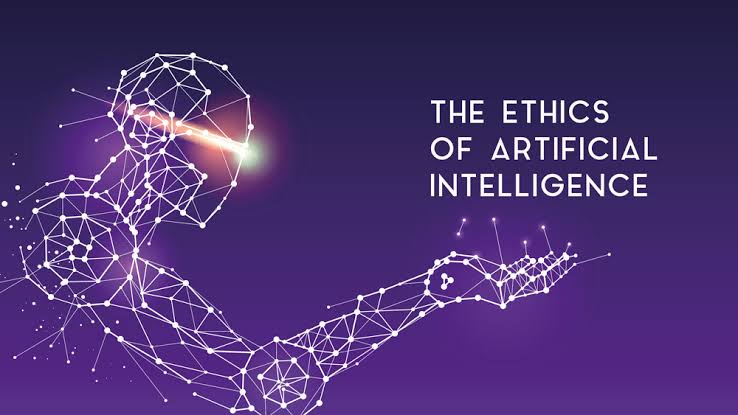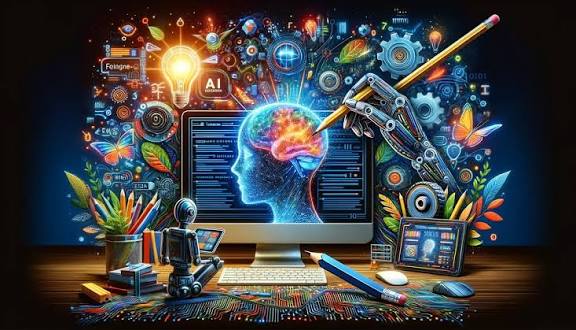
The Ethics of Artificial Intelligence
The ethics of Artificial Intelligence focuses on ensuring that AI technologies are developed and used responsibly. Key issues include bias, transparency, privacy, job displacement, and the misuse of AI in warfare and surveillance. Fairness, accountability, and human oversight are essential in preventing harmful consequences. As AI becomes more integrated into daily life, ethical considerations must guide innovation to avoid discrimination and promote trust.
✨ Raghav Jain

Introduction
Artificial Intelligence (AI) has evolved from a futuristic concept into an integral part of modern life. From personalized ads and voice assistants to facial recognition and self-driving cars, AI now shapes how we live, work, and interact with the world. But with its growing influence comes a wave of profound ethical questions that we can no longer afford to ignore.
Who is responsible when an AI system makes a mistake? Can machines make fair decisions? Should AI have rights? As AI continues to progress, these questions become more pressing. Ethics, in the context of AI, refers to the moral responsibilities and social impacts of developing and deploying intelligent systems. It challenges us to think deeply about fairness, transparency, accountability, and human rights in a rapidly changing digital era.
This article explores the most important ethical issues surrounding artificial intelligence, their implications, and the steps we must take to build a future where AI serves humanity responsibly. The year 2025 finds humanity deeply entwined with Artificial Intelligence (AI), a transformative technology that permeates nearly every facet of our lives, from the mundane to the profound, and as AI systems become increasingly sophisticated, capable of making autonomous decisions and impacting human well-being in significant ways, the ethics of their development, deployment, and governance have moved to the forefront of societal discourse, demanding careful consideration and the establishment of robust ethical frameworks to guide their responsible innovation and integration. The rapid advancements in AI, particularly in areas like machine learning, natural language processing, and computer vision, have unlocked unprecedented capabilities, offering solutions to complex problems and driving progress across various industries, yet these very capabilities also raise profound ethical questions concerning bias, fairness, accountability, transparency, privacy, autonomy, and the potential for misuse, necessitating a comprehensive and ongoing dialogue involving researchers, policymakers, industry leaders, and the public to navigate the ethical complexities inherent in this powerful technology and ensure its benefits are realized equitably and in a manner that aligns with human values and societal well-being. This exploration delves into the critical ethical considerations surrounding artificial intelligence in 2025, examining key areas of concern and the ongoing efforts to establish ethical guidelines and principles for its responsible development and deployment, encompassing topics such as bias and fairness in AI systems, accountability and responsibility for AI decisions, transparency and explainability of AI algorithms, privacy and data security in AI applications, autonomy and human control over AI systems, the potential for misuse and malicious applications of AI, the impact of AI on employment and the future of work, the ethical considerations in AI for healthcare and other sensitive domains, the need for robust governance and regulation of AI, and the importance of public discourse and education on AI ethics.
Bias and fairness in AI systems represent a critical ethical challenge, as AI algorithms learn from data, and if that data reflects existing societal biases related to race, gender, socioeconomic status, or other protected characteristics, the AI systems can perpetuate and even amplify these biases in their outputs and decisions, leading to unfair or discriminatory outcomes in areas like loan applications, hiring processes, criminal justice, and even healthcare, and in 2025, with AI increasingly being used in decision-making processes that directly impact human lives, ensuring fairness and mitigating bias in AI systems is paramount, requiring careful attention to data collection and preprocessing, algorithm design, and ongoing monitoring and evaluation to identify and address potential sources of bias and promote equitable outcomes across diverse populations.
Accountability and responsibility for the decisions and actions of AI systems pose a significant ethical dilemma, particularly as AI becomes more autonomous, as determining who is responsible when an AI system makes an error or causes harm can be complex, involving questions of liability for developers, deployers, and users, and in 2025, with AI systems operating in increasingly critical domains, establishing clear lines of accountability and responsibility is crucial for ensuring public trust and providing recourse in cases of AI-related harm, necessitating the development of legal and regulatory frameworks that address liability and establish mechanisms for redress when AI systems cause unintended or harmful consequences.
Transparency and explainability of AI algorithms, often referred to as "explainable AI" (XAI), are essential for building trust and understanding in AI systems, especially those used in high-stakes applications, as the "black box" nature of some complex AI models, particularly deep learning neural networks, can make it difficult to understand why a particular decision was made, hindering the ability to identify and rectify errors or biases, and in 2025, with the increasing deployment of AI in critical infrastructure and decision-making processes, enhancing the transparency and explainability of AI algorithms is crucial for ensuring accountability, fostering user trust, and enabling effective human oversight and intervention when necessary.
Privacy and data security are fundamental ethical considerations in the age of AI, as AI systems rely heavily on vast amounts of data, often including sensitive personal information, for training and operation, raising concerns about data collection, storage, processing, and potential misuse, and in 2025, with the proliferation of AI-powered surveillance technologies and data-driven applications, ensuring the privacy and security of individuals' data is paramount, requiring the implementation of robust data protection measures, adherence to privacy regulations, and the development of AI systems that respect user privacy and minimize data collection.
Autonomy and human control over AI systems represent a critical ethical balance, as while the ability of AI to operate autonomously can lead to increased efficiency and productivity, it also raises concerns about the potential for AI to make decisions that are not aligned with human values or intentions, and in 2025, with AI systems becoming more capable of independent action, maintaining meaningful human control and oversight is essential for ensuring that AI remains a tool that serves humanity's best interests, necessitating the development of mechanisms for human intervention, the establishment of clear boundaries for AI autonomy, and ongoing research into human-AI collaboration.
The potential for misuse and malicious applications of AI presents a significant ethical threat, as the very capabilities that make AI beneficial can also be exploited for harmful purposes, such as the development of autonomous weapons, the creation of sophisticated disinformation campaigns, and the use of AI for surveillance and social control, and in 2025, with the increasing power and accessibility of AI technologies, proactively addressing the potential for misuse is crucial, requiring international cooperation, the establishment of ethical guidelines for AI development and deployment, and the development of safeguards against malicious applications.
The impact of AI on employment and the future of work raises profound ethical and societal questions, as the automation capabilities of AI have the potential to displace human workers in various industries, leading to concerns about job losses, economic inequality, and the need for workforce retraining and adaptation, and in 2025, with AI-driven automation becoming increasingly prevalent, addressing the ethical implications for employment is crucial, necessitating proactive strategies for managing the transition to an AI-powered economy, including investments in education and training, the exploration of universal basic income, and the creation of new forms of work that leverage human-AI collaboration.
The ethical considerations in AI for healthcare and other sensitive domains, such as criminal justice and education, are particularly critical due to the high-stakes nature of these applications and their direct impact on human well-being and fundamental rights, as biases in AI used in healthcare can lead to disparities in diagnosis and treatment, while flawed AI in criminal justice can perpetuate systemic inequalities, and in 2025, with the increasing adoption of AI in these sensitive areas, careful ethical scrutiny and the implementation of robust safeguards are essential to ensure fairness, accuracy, and accountability and to mitigate potential harm.
The need for robust governance and regulation of AI is becoming increasingly apparent as AI systems become more integrated into society, as existing legal and regulatory frameworks may not be adequate to address the unique challenges posed by AI, necessitating the development of new policies and regulations that promote ethical AI development and deployment, address issues of bias, accountability, and transparency, and foster innovation while safeguarding societal values and human rights, and in 2025, with governments and international organizations actively exploring AI governance frameworks, establishing effective and adaptable regulations will be crucial for ensuring the responsible and beneficial use of AI.
Finally, the importance of public discourse and education on AI ethics cannot be overstated, as fostering a broad understanding of the ethical implications of AI among the public is essential for informed decision-making, building trust in AI technologies, and ensuring that AI development aligns with societal values, and in 2025, with AI becoming increasingly pervasive, promoting public awareness and engagement in discussions about AI ethics through education, media, and community forums is crucial for shaping a future where AI benefits all of humanity in a responsible and ethical manner. In conclusion, the ethics of artificial intelligence in 2025 represent a complex and multifaceted challenge that demands ongoing attention, dialogue, and the development of robust ethical frameworks to guide the responsible innovation and integration of this powerful technology into society, requiring careful consideration of bias, accountability, transparency, privacy, autonomy, the potential for misuse, the impact on employment, ethical considerations in sensitive domains, the need for governance and regulation, and the importance of public discourse and education to ensure that AI serves humanity's best interests and contributes to a just and equitable future.
1. Understanding Artificial Intelligence and Ethics
Before diving into the ethical issues, it's essential to understand what AI and ethics mean in this context.
- Artificial Intelligence refers to machines or systems capable of performing tasks that typically require human intelligence, such as learning, decision-making, language processing, and perception.
- Ethics is a system of moral principles that guide behavior, determining what is right or wrong, fair or unjust.
When combined, AI ethics involves designing, developing, and using AI technologies in ways that uphold human values and societal norms.
2. Bias and Fairness in AI Systems
One of the most significant ethical concerns in AI is algorithmic bias. AI systems are only as unbiased as the data they’re trained on—and many real-world data sets reflect societal inequalities.
Examples of bias include:
- Facial recognition software misidentifying individuals with darker skin tones more often than lighter-skinned individuals.
- Hiring algorithms favoring certain genders or educational backgrounds.
- Predictive policing tools disproportionately targeting minority communities.
Such biases can lead to discrimination, inequality, and social injustice. Developers and stakeholders must ensure that AI is trained on diverse, representative, and balanced data sets while implementing regular audits to minimize bias.
3. Lack of Transparency and Explainability
Many AI systems, especially those based on deep learning, are often referred to as "black boxes" because their decision-making process is not transparent—even to the engineers who created them.
Why is that a problem?
- Users don’t understand how decisions are made.
- Individuals affected by AI-driven outcomes (e.g., being denied a loan or flagged by surveillance) have no clear explanation or recourse.
- Developers can't easily correct mistakes or assess accountability.
Ethical AI must be explainable, interpretable, and transparent so that humans can trust and verify its decisions.
4. Data Privacy and Surveillance
AI thrives on data—especially personal data. But where do we draw the line between useful data collection and invasion of privacy?
AI systems are often involved in:
- Analyzing personal behavior for advertising
- Monitoring employees or students
- Collecting health records, location history, and biometric data
In authoritarian regimes, AI-powered surveillance is being used to monitor, control, and suppress populations, raising serious concerns about human rights violations.
Ethical AI development must prioritize data protection, user consent, and limited data usage, adhering to frameworks like GDPR (General Data Protection Regulation).
5. Autonomy and Human Control
AI systems are increasingly making decisions without human intervention—from managing financial portfolios to steering autonomous vehicles.
This raises questions like:
- Should a machine be allowed to make life-and-death decisions, such as in healthcare or warfare?
- Who is accountable if an autonomous car causes an accident?
- How much control should humans retain over intelligent systems?
The ethical principle of human-in-the-loop suggests that critical decisions should always involve human oversight, especially when human lives are at stake.
6. Job Displacement and Economic Inequality
As AI becomes more capable, it is expected to automate millions of jobs in sectors like transportation, manufacturing, retail, and customer service.
While AI can increase efficiency and reduce costs, it may also:
- Displace low-skilled workers and increase unemployment
- Widen the gap between tech-savvy elites and the rest of the population
- Concentrate wealth and power among a few corporations
An ethical AI future must involve:
- Reskilling and upskilling programs
- Social safety nets
- Inclusive innovation that benefits all layers of society
7. Autonomous Weapons and Military AI
Perhaps the most chilling ethical dilemma is the development of AI-powered weapons systems, also known as lethal autonomous weapons.
These systems can:
- Select and engage targets without human input
- Be used in cyberwarfare, drones, or battlefield robots
- Escalate conflicts and reduce accountability in war zones
Experts like Elon Musk and the late Stephen Hawking have warned that military AI could lead to an AI arms race and potential global catastrophe.
International treaties and strict regulation are essential to prevent misuse and maintain human accountability in warfare.
8. Artificial General Intelligence (AGI) and Superintelligence
While current AI systems are narrow (performing specific tasks), many researchers are working toward Artificial General Intelligence (AGI)—machines with human-like reasoning and adaptability.
The ethical concerns here are speculative but profound:
- What if AGI surpasses human intelligence?
- How do we ensure such intelligence aligns with human values?
- Can we “control” something more intelligent than us?
If not developed responsibly, superintelligent AI could become unpredictable, uncontrollable, and even pose an existential risk to humanity.
This makes it critical to establish ethical frameworks and safety protocols for AGI research well in advance.
9. Ownership, Accountability, and Liability
When an AI system causes harm—such as a misdiagnosis, accident, or financial error—who is legally and ethically responsible?
Possibilities include:
- The developers who created the algorithm
- The organization that deployed it
- The user who interacted with it
Without clear guidelines, accountability becomes murky, and justice for affected individuals is hard to achieve.
Developing legal frameworks that clearly define liability, ownership, and responsibility is essential to build trust in AI systems.
10. The Right to Human Dignity and Agency
Ethical AI should always uphold human dignity and ensure that individuals are not dehumanized, manipulated, or devalued.
Ethical concerns in this area include:
- Emotion AI that reads and manipulates human emotions
- Deepfakes used to spread misinformation or harass individuals
- AI replacing meaningful human interaction in caregiving or education
Technology should empower humans, not replace their roles as caregivers, decision-makers, and moral agents.
Efforts Toward Ethical AI Governance
Globally, various efforts are underway to promote ethical AI:
- The European Union introduced AI regulation laws to ensure safety and transparency.
- UNESCO adopted the first global AI ethics framework.
- Organizations like OpenAI, DeepMind, and IBM have created internal ethics boards.
- The IEEE Global Initiative on Ethics of Autonomous and Intelligent Systems provides detailed guidelines.
But challenges remain in enforcing these principles and ensuring cross-border collaboration to maintain consistency in AI ethics.
Conclusion
Artificial Intelligence has the power to transform society for the better—curing diseases, combating climate change, enhancing education, and more. But without a strong ethical foundation, it also has the potential to deepen inequality, infringe on rights, and erode trust.
As AI becomes more embedded in our daily lives, we must ask: Are we building machines that serve humanity, or are we heading toward a world where machines replace or exploit us?
The ethics of AI is not just a technical or philosophical issue—it’s a human responsibility. It requires collaboration between technologists, ethicists, policymakers, and citizens to create a future where AI is aligned with our values and aspirations.
Only by putting ethics at the heart of innovation can we truly ensure that AI serves the greater good and contributes to a more just, inclusive, and humane world.
Q&A Section: The Ethics of Artificial Intelligence
Q1: What are the ethical concerns surrounding Artificial Intelligence?
Ans: The main ethical concerns include bias in algorithms, lack of transparency, invasion of privacy, potential job loss, and the misuse of AI in surveillance and warfare.
Q2: How does AI bias occur and why is it dangerous?
Ans: AI bias happens when algorithms are trained on biased data. It can lead to unfair treatment in areas like hiring, lending, and law enforcement.
Q3: Why is transparency important in AI systems?
Ans: Transparency allows users and developers to understand how AI makes decisions, ensuring accountability and reducing the risk of harmful or unjust outcomes.
Q4: How can AI affect human privacy?
Ans: AI can process vast amounts of personal data, which may be used without consent, leading to a serious breach of individual privacy rights.
Q5: What are the ethical implications of autonomous weapons using AI?
Ans: AI-powered weapons raise moral questions about responsibility, accountability, and the potential for uncontrolled warfare or targeting errors.
Q6: How can AI impact employment and workers’ rights?
Ans: AI automation can replace human jobs, especially repetitive tasks, which may increase unemployment and affect economic equality if not managed properly.
Q7: What is the importance of fairness in AI development?
Ans: Ensuring fairness in AI means preventing discrimination and providing equal treatment for all users, regardless of race, gender, or background.
Q8: Should AI be given rights or personhood?
Ans: This is a debated topic. Most experts believe AI should remain tools, not entities with rights, to maintain human control and moral responsibility.
Q9: How can we ensure ethical AI usage by companies?
Ans: Through regulations, ethical AI frameworks, transparency, regular audits, and inclusive data practices that prevent misuse and bias.
Q10: What is the role of governments in ethical AI development?
Ans: Governments should create policies and legal frameworks that guide responsible AI use, protect citizens, and promote innovation with integrity.
Similar Articles
Find more relatable content in similar Articles

The Future of Social Media Ma..
AI is transforming social med.. Read More

Top Educational Apps That Boos..
Educational apps are transfor.. Read More

Smart Study to Smart Career: ..
Smart study and career apps a.. Read More

From Classroom to Career: App..
Skill-building apps help stud.. Read More
Explore Other Categories
Explore many different categories of articles ranging from Gadgets to Security
Smart Devices, Gear & Innovations
Discover in-depth reviews, hands-on experiences, and expert insights on the newest gadgets—from smartphones to smartwatches, headphones, wearables, and everything in between. Stay ahead with the latest in tech gear
Apps That Power Your World
Explore essential mobile and desktop applications across all platforms. From productivity boosters to creative tools, we cover updates, recommendations, and how-tos to make your digital life easier and more efficient.
Tomorrow's Technology, Today's Insights
Dive into the world of emerging technologies, AI breakthroughs, space tech, robotics, and innovations shaping the future. Stay informed on what's next in the evolution of science and technology.
Protecting You in a Digital Age
Learn how to secure your data, protect your privacy, and understand the latest in online threats. We break down complex cybersecurity topics into practical advice for everyday users and professionals alike.
© 2025 Copyrights by rTechnology. All Rights Reserved.